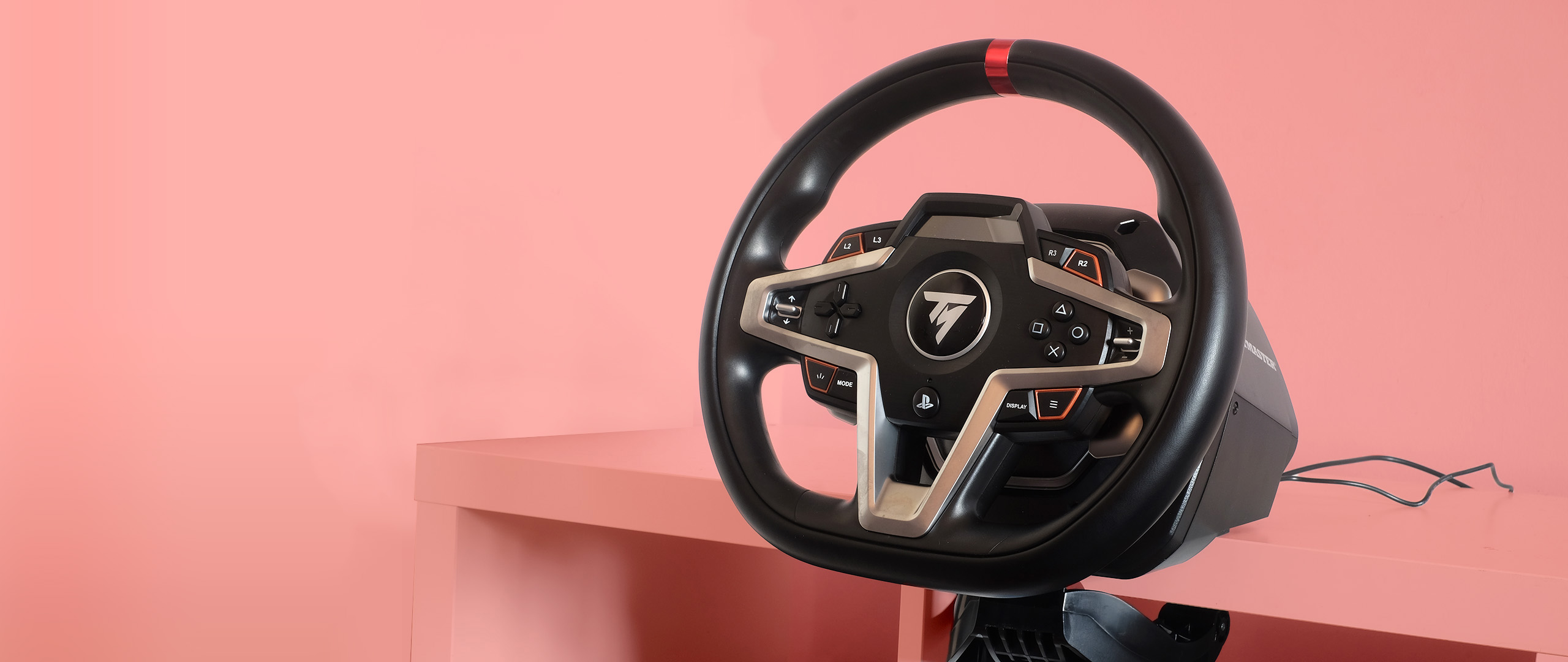TechRadar Verdict
The Thrustmaster T248 doesn't offer the racing wheel progress we were, perhaps naively, hoping for. But it is a solid alternative to the Logitech G923 for PS5 gamers. It also fixes the most common complaint of older affordable Thrustmaster bundles by including a good pedal board.
Pros
- +
Better pedal set than older Thrustmasters at this level
- +
Easy to use
- +
Engaging force feedback when matched with well-programmed games
Cons
- -
Somewhat limited torque and continuous resistance
- -
Wheel is slow to re-center
- -
Hybrid FF system results in granular rotation feel
- -
Noisy, kinda nasty, gear paddle controls
Why you can trust TechRadar
Two minute review
The Thrustmaster T248 is a force feedback racing wheel released in 2021 for PC and PlayStation consoles. We mention the year because some of the wheels you can buy today have been around for absolutely ages.
It is not a series-topper, brimming with brand new disruptive technology. The Thrustmaster T248 sits under wheels like the Thrustmaster T300GT in terms of performance, and seems more like a follow-up to the entry-level Thrustmaster T150.
Why? The Thrustmaster T248 doesn’t have the ultra-smooth rotation you get with a pure belt driven racing wheel and its force feedback isn’t as powerful as mid-range classics like the step-up Thrustmasters and the dearly departed Fanatec CSL Elite.
As such, the Thrustmaster T248 does not wipe the floor with all the competition at $399.99/£299.99/$599.99AU. However, it is one of the most complete-feeling racing wheels available at the price thanks to its surprisingly realistic-feeling pedal board.
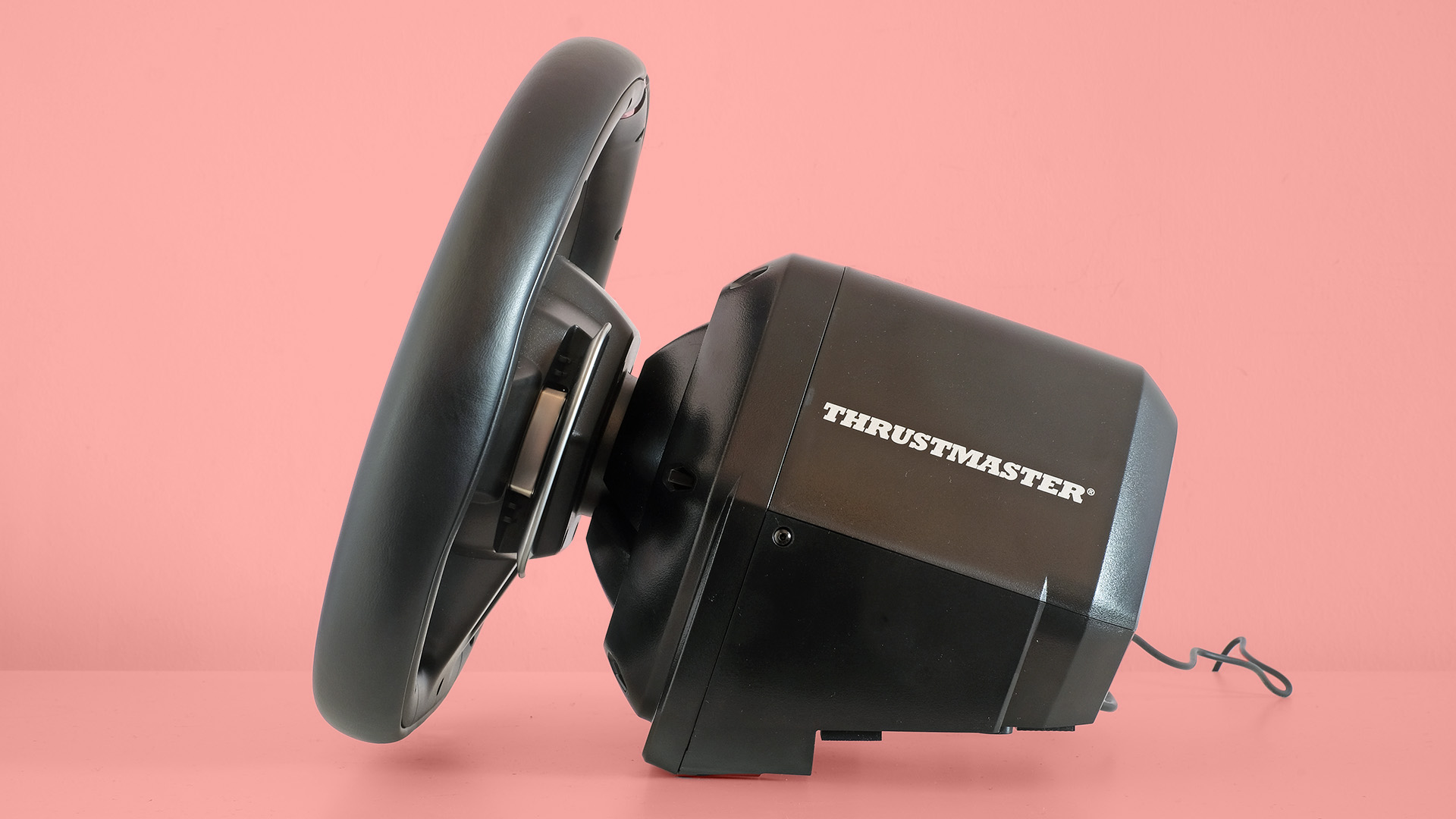
This wheel is a good fit as a sort of “sim-cade” model. We wouldn’t suggest it for someone who thinks they are going to go right off the deep end into competitive iRacing tournaments. But it is simple to use, doesn’t demand a heavy duty rig to keep stable and offers far better pedals than Thrustmaster’s own 2-pedal set.
It also side-steps upgrade-itis, in one sense at least, because the Thrustmaster T248 is not part of a modular system. You can’t upgrade the rim, creating a clear delineation between this wheel and Thrustmasters top models. Still, you can add a separate gear shifter if you like.
You also need to take our observations in the right context. While we’re not bowled over by the changes made in this brand new generation, to get a true next-level experience you’d have to upgrade to something like the fab-looking Fanatec CSL DD. And for the Thrustmaster T248’s money you just get that wheel base, not the the rim and pedals.
Design
Thrustmaster has tried to address some of the criticisms levelled at wheels like the T150 and T300RS in the T248. Our standard advice at this level in the past was if you want good pedals and a nice-feeling wheel, and don’t mind entry-level force feedback, buy a Logitech.
The Thrustmaster T248 has notable upgrades to the rim design and the bundled pedals. Most Thrustmaster rims are finished in hard plastic or rubber, but the T248’s outer has a lightly padded leather-effect finish.
This change is a partial success. Only half of the rim has this leather cover. The inner part is still hard plastic, and a noticeable deep seam sits under your palms at all times. Despite Thrustmaster’s best efforts, the full leather Logitech G923 still feels better.
We’re also not huge fans of Thrustmaster’s styling here. The T248’s rim is very much a “gamer” design, rather than one that seems to try to emulate the often more reserved look of a real-life steering wheel.
This wouldn’t necessarily be a bad thing if the wheel itself were not made of somewhat low-weight plastic. You can’t beat the feel of an aluminium core racing wheel, and the Thrustmaster T248 is not one of those.
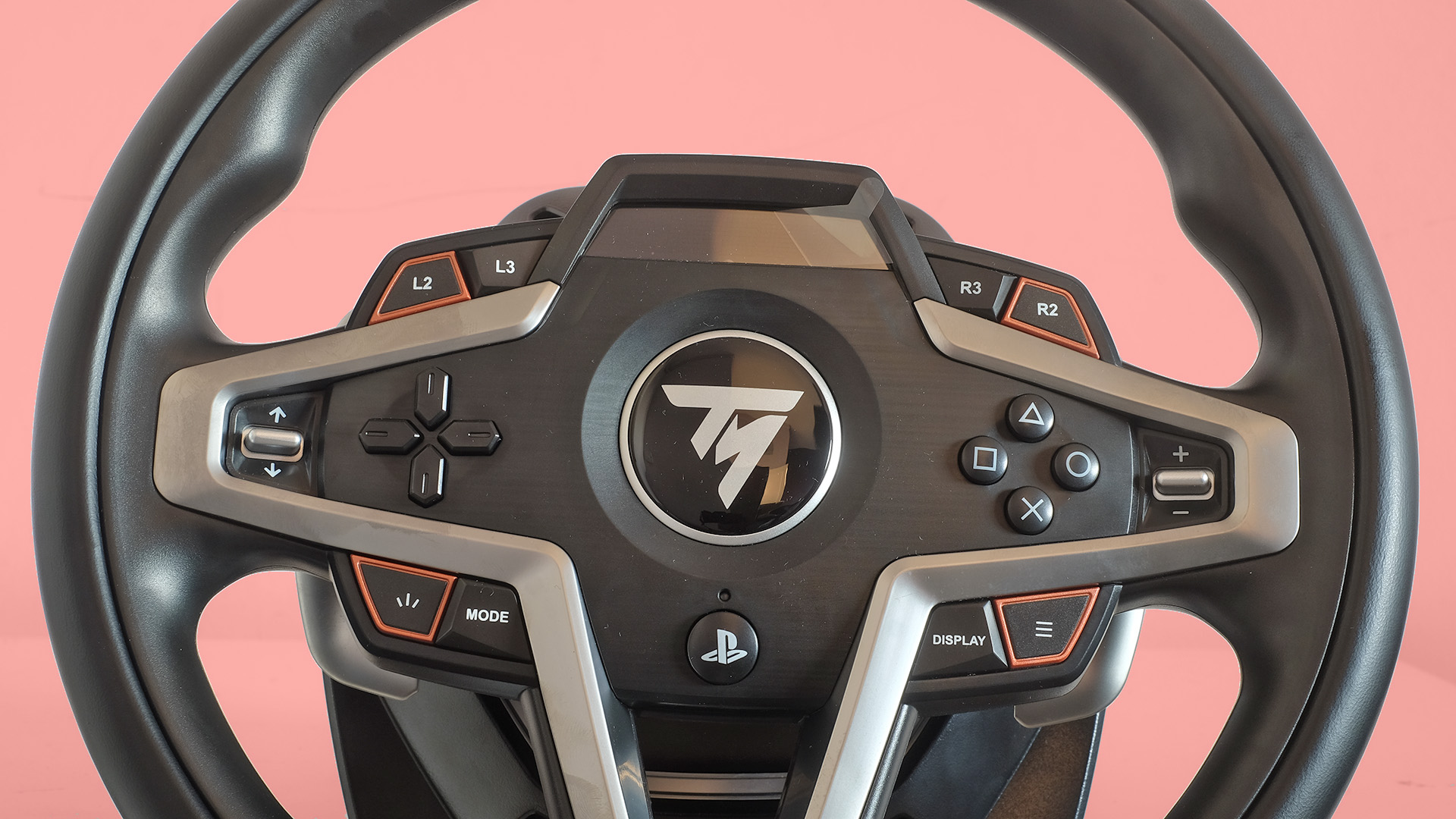
Still, there are significant practice benefits to Thrustmaster’s approach. Both the wheel base and the rim are light, which makes digging the thing out of a cupboard and setting it up quicker, and less like a chore. It also opens up your mounting options.
While we’d still suggest using either a wheel stand or a solid table, we tried attaching it to a fairly light coffee table and it worked just fine. We’re a world apart form the ultra-heavy Fanatec ClubSport 2.5 here, for better and worse. The Thrustmaster T248 comes with a screw-in mount clamp, and the pedal board has some rubber feet on the bottom — although these are pretty rubbish so we’d suggest putting an extra layer of something grippy on most surfaces at the very least. A cheap non-slip webbing mat can work wonders.
Force feedback
If you’re looking for a way to get the full force feedback racing wheel experience without spending a fortune, you’ve found it. The Thrustmaster T248 is a fantastic step up from using a controller, particularly if you’ve never tried a racing wheel before.
Force feedback lets you “feel” the road, using motors in the wheel base that emulate the forces of the road, and the differences in resistance as the tyres start to lose grip on those tricky corners.
We tested the Thrustmaster T248 primarily with GT Sport on PS4, alongside Assetto Corsa and Euro Truck Simulator 2 on PC. This wheel already supports the most important racing games on console, including DIRT 2.0 and F1 2021 as well as those already mentioned.
However, we don’t think this actually marks a big step forward for the racing wheel space.
For example, the Thrustmaster T248 has a “hybrid” drive system, which sounds good on paper but is not actually the ideal. This means it uses both belts and gears in the transmission between the motor and the rim.
The result is the Thrustmaster T248’s turning is not entirely smooth. It feels a little granular or notchy, much like the Logitech G923.
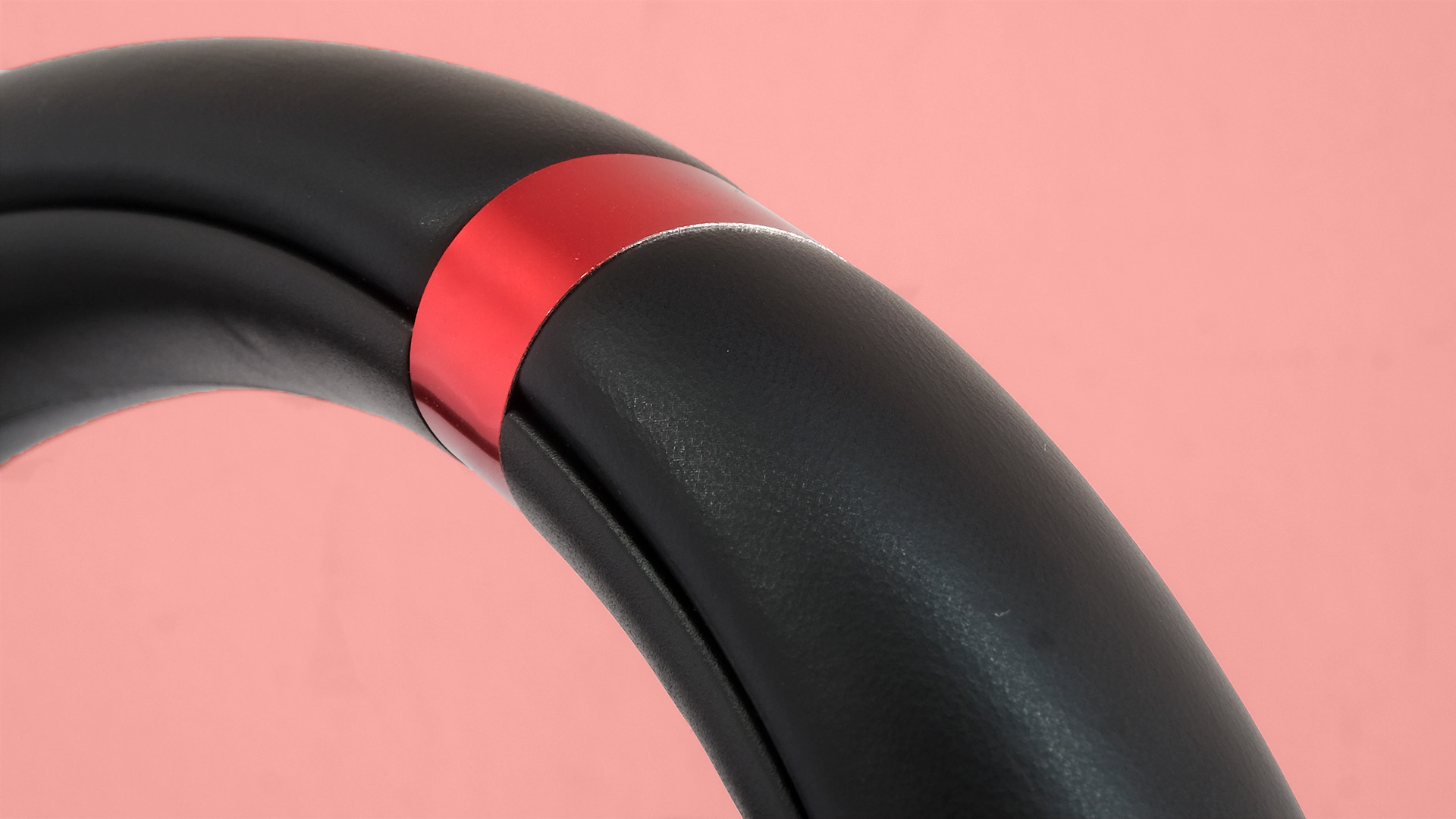
Torque is also just OK. This tells you how much the Thrustmaster T248 can pull against your turns, how much of a struggle it can put up against your driving. In an ideal scenario we like to see a wheel that can actually pull a little more than we’d like to feel on a day-to-day basis.
That’s just what we got in the Thrustmaster R300 and Fanatec CSL Elite (RIP). But maxed-out the Thrustmaster T248 is not too much of a shoulder-strainer — which to be fair is in line with it being aimed at fairly mainstream racing game fans.
There’s a certain cartoonishness to its force feedback at times in GT Sport, because the vibration effects of car jolts and the grinding-like effect that can happen when you car loses grip are significantly more marked than the pull against your turns.
The speed at which the Thrustmaster T248’s wheel returns to centre is also pretty slow, and it’s quite noticeable if you’re not a first-time wheel user. When pulling off a huge turn the wheel should really whip back at quite a pace. This one trundles.
You do have some control over the Thrustmaster T248’s force feedback response. There are three modes you can switch between on the wheel itself, and the LCD display shows you which you’re in when you dig into the menu.
However, judging by both Thrustmaster’s documentation and our testing, these affect the force feedback curve, not its peak power. Mid-grade responses are more forceful, but the Thrustmaster T248 simply can’t offer the sense of grappling with the wheel a higher-end model can offer.
A switch to a different game demonstrated how important the programming of force feedback is, though. In GT Sport on PS4, the Thrustmaster T248’s feedback can seem a little rudimentary, but it shines in Assetto Corsa (tested on PC).
While it doesn’t fix the slow return of the wheel or the somewhat limited maximum resistance during turns, Assetto Corsa makes the Thrustmaster T248 sing. Its road effects seem radically more nuanced, and the sense of realism is genuinely impressive.
Pedals and shifters
The Thrustmaster T248 comes with a three-pedal board, and it’s one of the parts that helps make the wheel as a persuasive package despite the slightly limited parts we’ve already moaned about.
Thrustmaster often sold its “affordable” wheels with basic 2-pedal boards that felt like starter sets, designed to be replaced when you got into the hobby a little more. While this pedal board is not going to challenge a high-end Fanatec set, it does have all the basics you need for fairly realistic play, plus a bit more.
The pedals have metal caps, there’s a clutch pedal and the brake offers good resistance, without being so stiff it absolutely needs a specialised mount frame. Thrustmaster also includes a second black-colored spring, should you want an even stiffer feel. It requires a tiny bit of DIY, but only takes a few minutes.
The accelerator pedal cap can be moved up and down a little, and all three caps can be shifted left and right thanks to the multiple spacer holes on their surface. This is a smart way to let you tweak the feel of the pedals while using a fairly basic construction. The inner part of the pedal structure is a plastic honeycomb, for example, and the entire pedal board is quite light.
However, this is where the Thrustmaster T248 demonstrates real progress for the company’s pedals. This set is miles out front of the two-pedal sets Thrustmaster typically bundles in at around this price. It is also a smarter design than the classic T3PA Add-On set, which costs almost half the price of this entire bundle (at original prices).
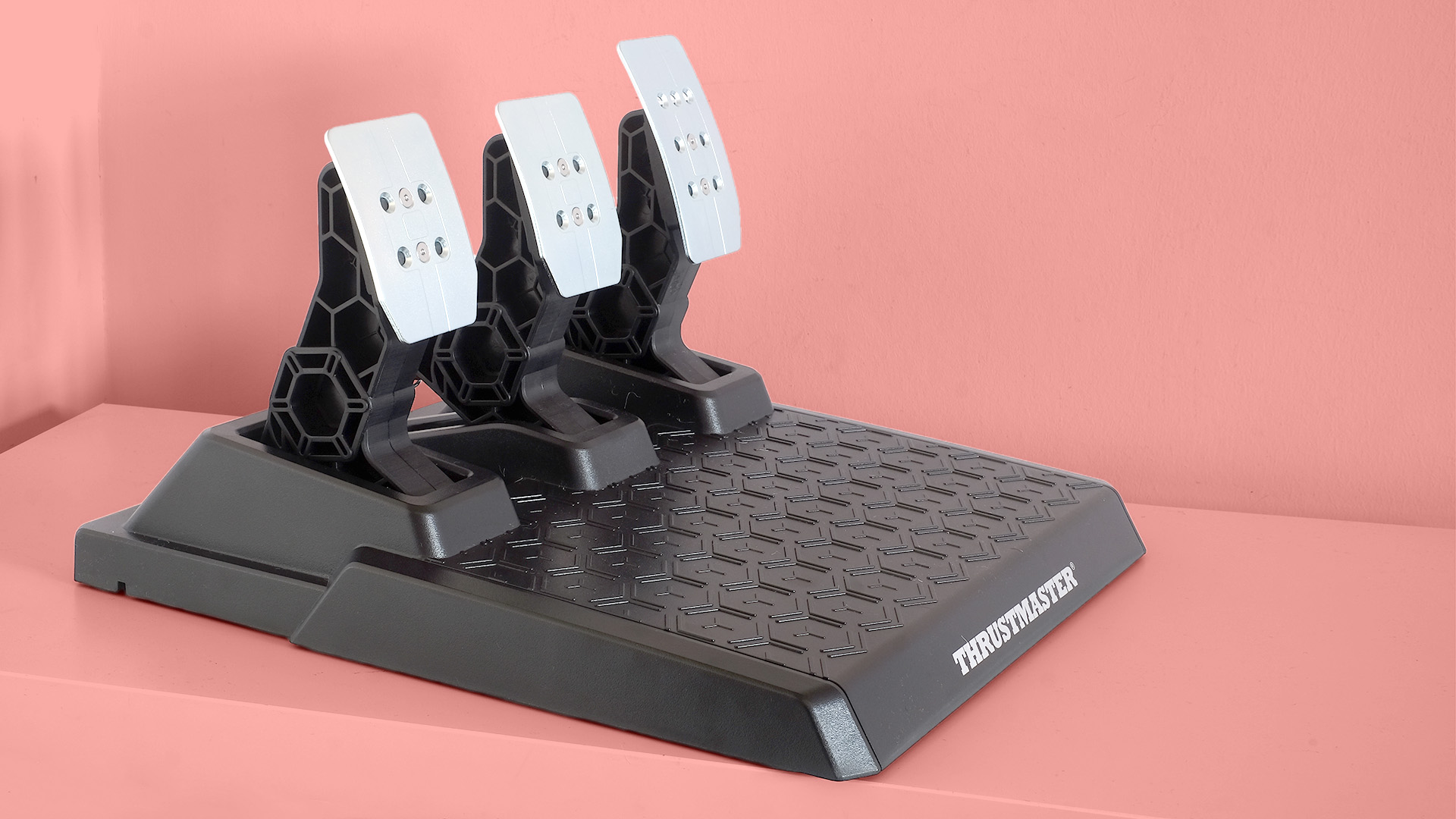
It does introduce an issue if you’re new to racing wheels, though. A relatively stiff brake means the board will gradually be pushed away from you unless it’s secured in some way. While the rim and wheel base don’t cry out for a dedicated frame or stand, these pedals absolutely benefit from one. Putting this board on carpet won’t suffice.
Thrustmaster gets full marks for making its lower-tier pedals much better, but we think most will not like the T248’s gear shifters. These, as usual, sit behind the wheel, and are almost certainly the loudest gear shifters we’ve ever heard in a racing wheel.
The mechanical clonk is distractingly noisy, and the feel of these shifters is just not on the same level as the metal paddles of the Logitech G923. They’re plastic, and the heavy feel of the mechanism is at odds with the light feel of the materials.

Display
We’re leaving the Thrustmaster T248’s display to last because it kinda represents a misallocation of resources when things like the rotation smoothness and shifters are more important.
The screen can be used to show stats like your speed, gear ratio or time — the meaning of which will vary from game to game. We tried it with Euro Truck Simulator 2, where it’s fairly useful to check on your speed — it's a game in which you are penalized for speeding. However, as this display sits at the centre of the wheel, its arguably too far out of your peripheral vision to be of that much use in faster-paced games.
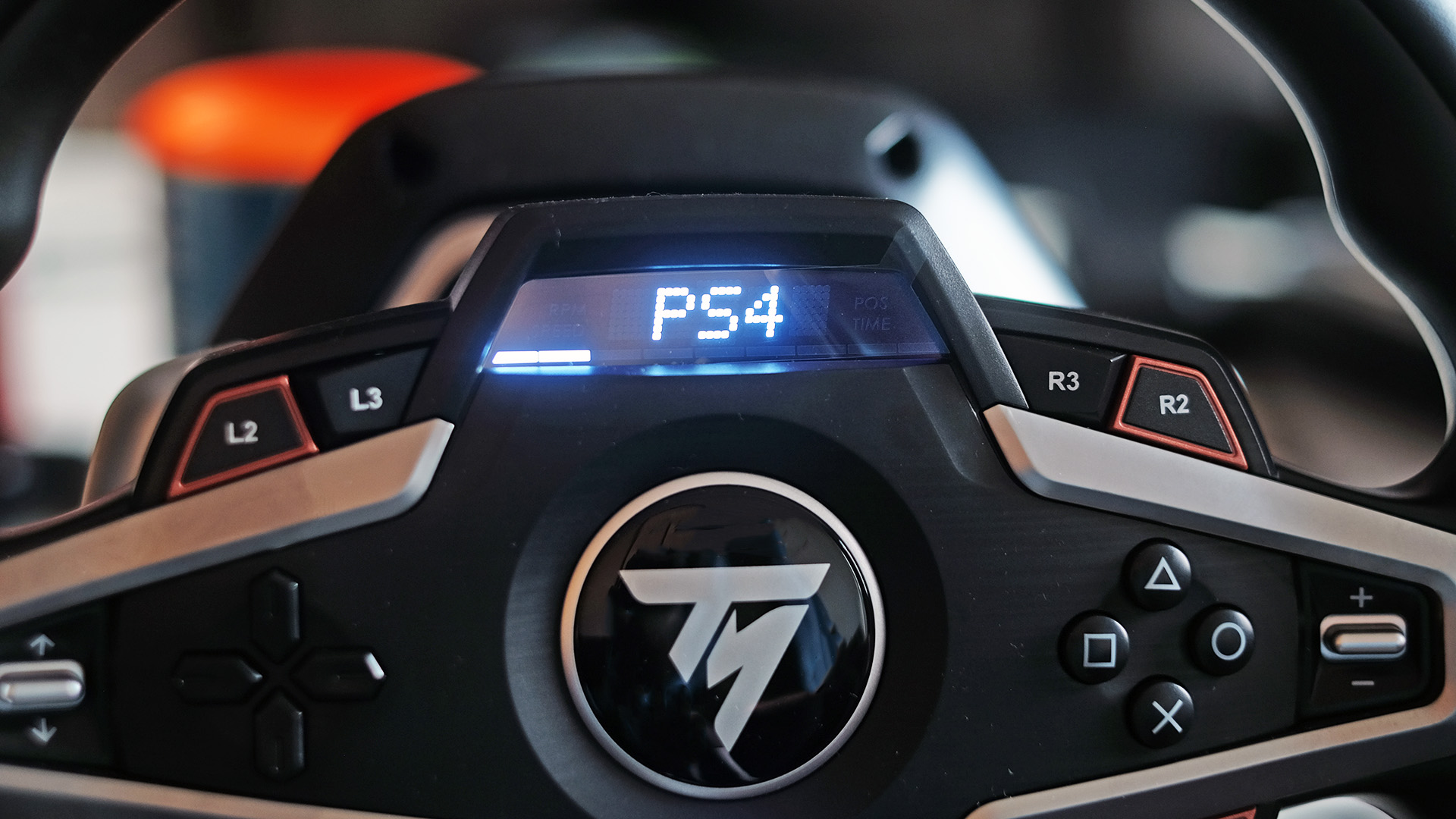
Not all games support it either. Here’s the list at the time of review:
- American Truck Simulator – PC
- ASSETTO CORSA COMPETIZIONE – PC [support coming soon]
- AUTOMOBILISTA 2 – PC
- DiRT®5 – PC (STEAM version only)
- DiRT®5 – PS4
- DiRT®5 – PS5
- Euro Truck Simulator 2 – PC
- F1 2020 – PC
- F1 2020 – PS4
- F1 2021 – PC
- F1 2021 – PS4
- F1 2021 – PS5
- iRacing® – PC
- RaceRoom Racing Experience – PC
- WRC 10 – PC
- WRC 10 – PS4
- WRC 10 – PS5
More may be supported by the time your read this. Check the Thrustmaster website for further info.
The display is useful in other ways, because it offers access to the on-wheel parameters, like force feedback modes, without needing a PC or console companion app to make changes.
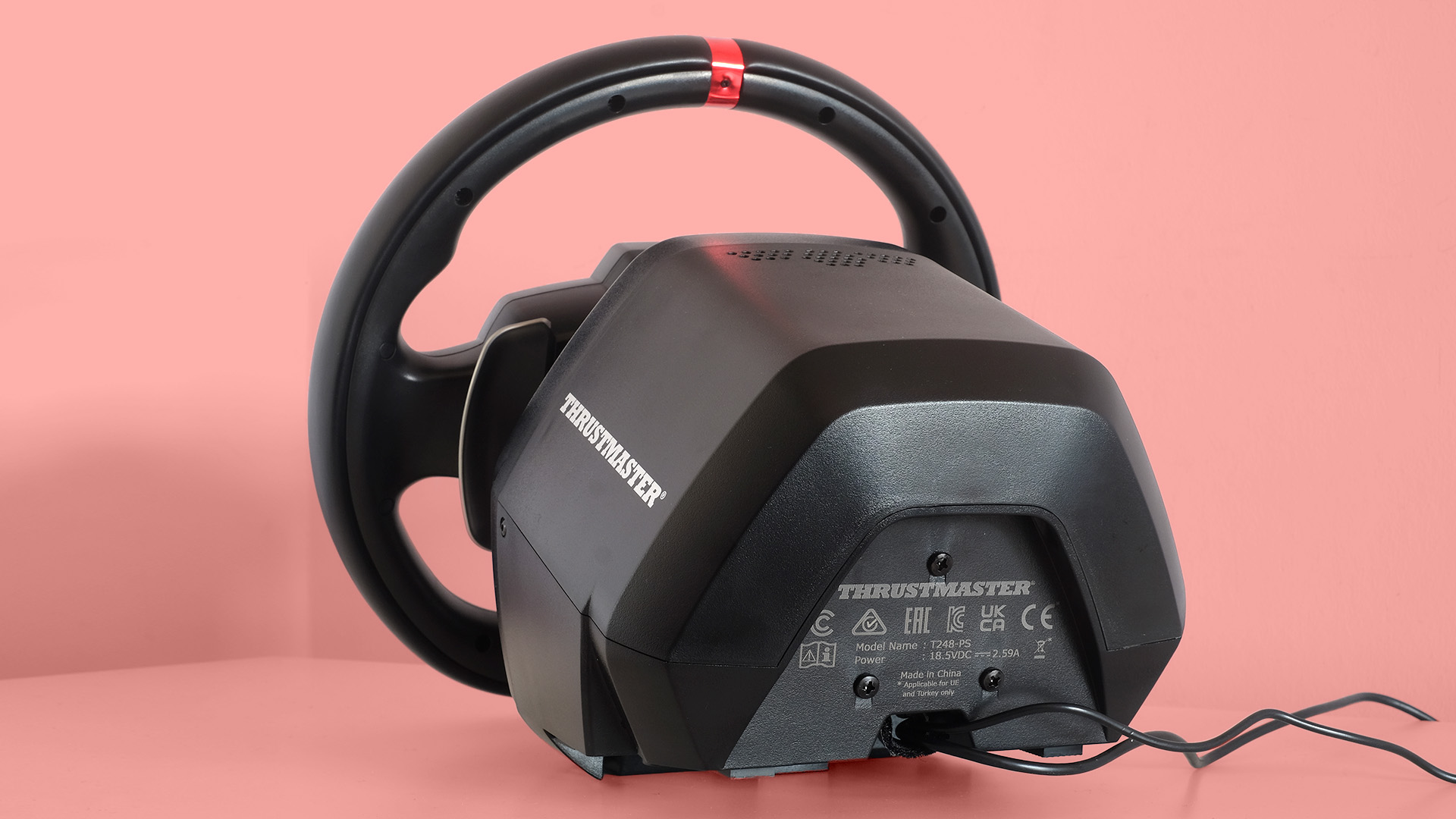
T248 versus Logitech G923
We hoped the Thrustmaster T248 would arrive and become the go-to recommendation for those who want a reasonably affordable racing wheel, pushing the Logitech G923 out of the picture. That hasn’t happened, and instead we have to continue the dance of listing priorities to work out which is right for you.
The Thrustmaster has a great new pedal board with adjustable elements and brake tension. However, the hybrid belt/gear force feedback system results in a slightly “gritty”, notchy or granular feel — this even more obvious in the Logitech, but Thrustmaster’s older belt-driven systems are smoother.
The Logitech wins for the feel of the wheel rim, and its significantly better gear shifters.
Both are good buys for those who can’t afford a Fanatec CSL DD, which is where the real innovation is happening right now — at double the price, mind. Which would we most likely buy? Neither, as we're so picky about force feedback feel the Thrustmaster T300RS GT takes the lead.
However, it comes with Thrustmaster's older pedal board so we're keen to see if the company updates its bundles with the set set in tow.
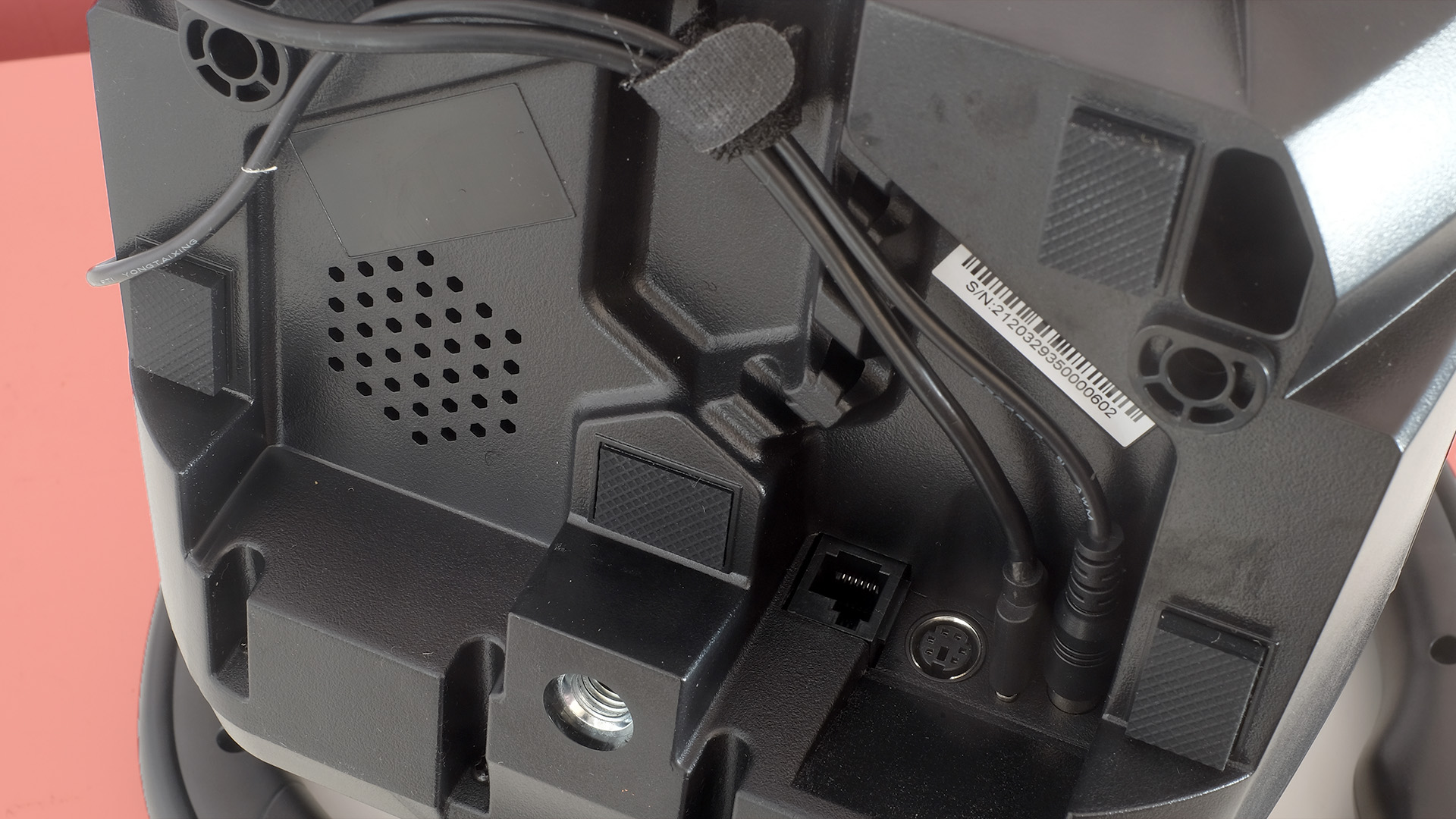
Reasons to buy
You want the full package at a sensible cost
Unlike most older Thrustmaster racing wheel packages, the Thrustmaster T248 includes a very decent set of pedals with customizable brake resistance. You won't need to upgrade from this lot unless you decide you want a higher-end wheel all-round.
You want a racing wheel for seasonal/occasional use
All parts of the Thrustmaster T248 are fairly light, making them easier to mount and store as you racing habit waxes and wanes. The bundled clamp will fasten the wheel to almost any table, although we still recommend some form of dedicated wheel stand thanks to the fairly realistic higher-resistance brake pedal.
You like the idea of the on-wheel display read-out
With certain games, the LCD screen on the wheel itself can relay telemetry data, like your speed and revs. While it's positioned a little low for instant peripheral vision feedback and does not support all games, it's handy for slower-paced titles like Euro Truck Simulator 2 and American Truck Simulator.
Reasons not to buy
You want a quiet wheel
The T248 doesn't have noisy cooling fans or a clunking force feedback system but its gear shifter paddles are bizarely noisy, and unusually stiff. We found them distracting when playing game audio through a set of speakers, rather than headphones/a headset.
You want ultra-powered force feedback
The T248 is typical of an entry-level force feedback racing wheel, in that its motor power/torque is not stratospheric. You'll need up upgrade to something like the Fanatec DD to get that. This wheel feels more tuned for fun, although we think its "hybrid" feedback system is actually a step down from some older Thrustmaster models, as it results in a notchy feel.
You play a lot of Xbox
It's normal for these racing wheels to support only PS4/PS5 or Xbox One/Xbox Series consoles. At the time of review you can only get a PlayStation version of this wheel, although both work just fine with PCs too.
Andrew is a freelance journalist and has been writing and editing for some of the UK's top tech and lifestyle publications including TrustedReviews, Stuff, T3, TechRadar, Lifehacker and others.
